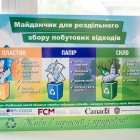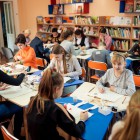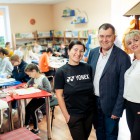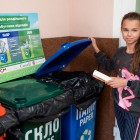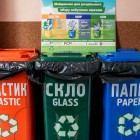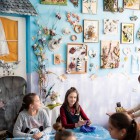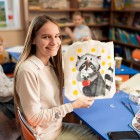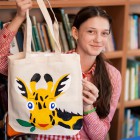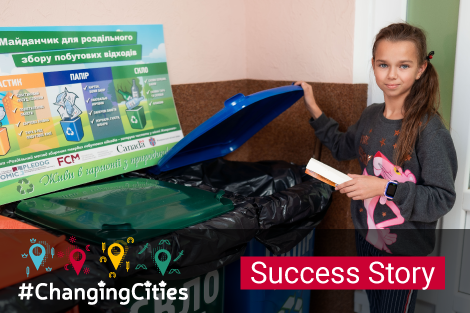
The Zhmerynka City Council was awarded a grant by the Partnership for Local Economic Development and Democratic Governance (PLEDDG) in 2018 to raise environmental awareness and begin solid waste management sorting in schools and other public buildings. Young people and public sector staff joined together to launch the initiative.
Solid waste management (SWM) collection and recycling is a challenging problem for the majority of population centers in Ukraine. Experts estimate that landfills account for 4 to 7% of the territory of Ukraine, with 15 to 17 million tonnes of waste added annually. Only one-tenth of waste collected ends up getting recycled. Zhmerynka with its population of 35,000, generates over 17,000 tonnes of solid waste annually. Much of this waste consists of materials that can be recycled and reused. This calls for an integrated approach to waste sorting and recycling in the city.
Under the auspices of PLEDDG, Zhmerynka bought 50- and 120-liter containers for sorting of plastics, glass, and paper. They have been installed at 26 locations across the city: City Hall, kindergartens, schools, the local library, and other public institutions. Sorted waste is regularly collected by a local waste management contractor Bravis and transported for recycling to Vinnytsia.

“At some schools, teachers and pupils have teamed up to collect and bring glass and waste paper to waste collection points. Schoolchildren use the proceeds to buy trees and plant them next to their educational institutions. We conduct an active waste sorting campaign in the city’s info space. With the financial backing of PLEDDG, we have bought and installed light boxes with posters devoted to waste sorting. Relevant information has also been posted at every container site. As part of the project we have also printed over 17,000 booklets and fliers devoted to separate waste collection: they have been distributed at schools, publicly funded institutions, and as part of various city-wide activities,” says Anatoliy Konoval, chief of the economics directorate at Zhmerynka City Hall.
The project also started an environmental club at the Zhmerynka family reading library, which is committed to energizing the public, raising environmental awareness among children and adults through thematic master classes and social activities. With the financial backing of PLEDDG, the club has bought office equipment and appliances for educational activities at a high technical level, as well as additional desks and chairs. Throughout 2019, the club hosted 14 thematic meetings attended by over 320 people. Also, 14 promotional activities and master classes titled “Paint an eco-bag” have been held at various locations across the city. Their objective has been to reduce the usage of plastic bags and popularize environmental care. According to Kateryna Semets, environmental club leader and public activist, library employees have taught children. She also became personally involved in the activities, sharing her years-long environmental activism experience.

“Residents of Zhmerynka painted 750 eco-bags and 329 eco-backpacks as part of the project. Over 900 children and 150 adults attended the master classes. They took home their hand-stylized creations, so now one gets the impression that half the city’s residents walk around with eco-bags! Also, 300 boys and girls made cloth bags using the Japanese furoshiki technique. Needless to say, activities like these are the most exciting and memorable for children. Even though they undoubtedly attract attention to environmental problems, awareness-raising educational activities still have a greater impact and more benefits. I believe that awareness raising among children is of utmost importance. Schoolchildren share their knowledge at home, which often causes major positive shifts in their families’ attitude toward the environment. Having communicated with children over the course of the year, I have noticed that some of them realized that they are not alone in their concerns about the state of the environment. Some children gave a lot of thought to possible ways to improve the environment and have already come up with their own solutions which they promote among their friends and family,” Kateryna Semets says.
In 2019, the environmental club hosted 25 trainings devoted to waste sorting, which were attended by 200 people. In addition to learning about the theoretical aspect of the problems of waste sorting and ways to overcome the existing situation, they also completed practical training, such as touring the Green School for the Active Community and visiting the deep waste sorting station at Vasyl Stus Donetsk National University in Vinnytsia where they had an opportunity to learn first-hand about the process of solid domestic waste recycling. They held ten roundtable discussions in November devoted to the subject of waste sorting, which were attended by 145 people. Schoolchildren learned about the role of waste recycling in the life of mankind and about the possible ways to reuse domestic waste. They also discussed waste sorting at home.
Anastasia Kohut, who goes to the 9th grade at Zhmerynka School Lyceum No. 2, said that her parents taught her from a young age: all items should be used sustainably and cannot be disposed of just like that. As she grew older, she was inspired by a popular blogger who used social networks to share her experience with meticulous waste sorting and broached other environmental issues. Anastasia decided to acquire new knowledge and treat the environment with as much care as possible.

“At the environmental club, my co-eds and I created handmade articles out of used items: earrings from plastic, boxes from cardboard, and paper decorated with cut-outs from old library magazines. We even thought about selling our creations, but this still remains a conceptual idea for now. I would bring pieces of fabrics home and we would make eco-bags out of them. I can say that the topic of the environment concerns everyone in my class to some degree or other. We collectively care about cleanliness at school. Littering and walking away is not considered cool with us. Moreover, all schools in the city now have containers for waste sorting. This is very convenient. My younger sister goes to a kindergarten and children there are also taught to sort waste. I have personally observed that children use containers for separate waste collection more often than assorted waste bins,” Anastasia Kohut says.
Over the course of the project, there have been qualitative changes in the level of environmental awareness of the city’s residents. Locals have become more interested in sustainable waste sorting practices with almost one in ten city residents sorting solid waste at home. We can see more often that youngsters and adults alike choose not to use plastic bags when they go shopping for groceries. Locals take an active part in city-wide volunteer street cleaning campaigns that residents participate in en masse in their respective districts. Over the course of the project, Zhmerynka residents collectively eliminated 12 makeshift landfills in the city, improved the grounds of the city’s community park, and restored plants in alleyways of residential neighborhoods and public gardens.

“We are mindful of the environmental aspect of our activities at all times: we recently began conducting an environmental assessment of every program approved by the city council. We must plan compensatory activities to make up for the adverse environmental impacts. We plan to continue allocating funding for educational outreach work among children. We always do our best to arrange integrated and diverse environmental activities in order to inform Zhmerynka residents about environmental problems from different perspectives,” Anatoliy Konoval adds.
A recurring theme of PLEDDG activities is environmental sustainability that ensures integration of environmental aspects in every aspect of work – from strategic planning of urban development to implementation of specific initiatives. Under the auspices of PLEDDG, Zhmerynka has developed the City Development Strategy up to 2030 and carried out its strategic environmental assessment in order to suggest possible ways to minimize adverse impacts and maximize the favorable effect on the city’s environment. Owing to this, improvement of the state of the environment and environmental safety has been chosen as one of the key priorities for the city for the decade to come.
| Download success story “Zhmerynka sorts waste and promotes environmental awareness among children and youngsters” in pdf |


